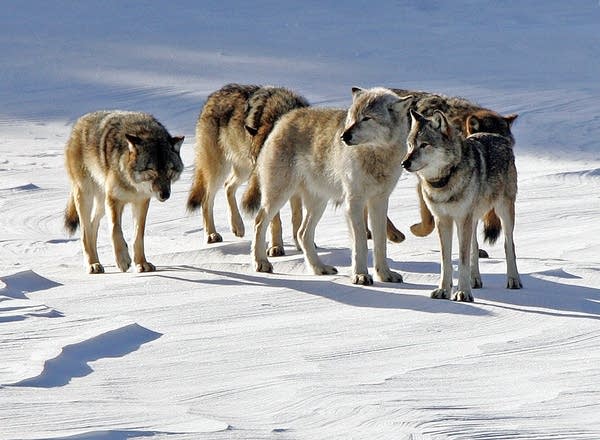Feds propose de-listing gray wolves from endangered species list

The U.S. Fish and Wildlife Service said Friday that the population of gray wolves in Minnesota, Michigan and Wisconsin has recovered enough to be removed from federal protection.
It's the fourth attempt by the federal government to lift the gray wolf protections first put in place in 1974. The gray wolf remains a threatened species in Minnesota and an endangered species in Wisconsin and Michigan after environmental groups sued to keep the protections in place for the western Great Lakes area.
Nearly 3,000 wolves in Minnesota have partial protection under the law. They can be killed when they've harmed livestock. More than 1,200 wolves in Wisconsin and Michigan's Upper Peninsula have full protection.
The proposal to lift protections will be published within the next two weeks, allowing for a 60-day public comment period to begin. Officials have said a final decision will be made by the end of the year.
Create a More Connected Minnesota
MPR News is your trusted resource for the news you need. With your support, MPR News brings accessible, courageous journalism and authentic conversation to everyone - free of paywalls and barriers. Your gift makes a difference.
Laura Ragan, a wildlife biologist with the Fish and Wildlife Service's Midwest office, said the latest proposal addresses some of the procedural questions the courts raised. But she said the biological aspects of the proposal remain much the same.
"The wolves in this part of the country have continued to increase or at least maintain stable, high numbers," Ragan said.
The U.S. Fish and Wildlife Service's attempts to remove protections for wolves have led to a few temporary rule changes. Efforts to remove protections began in 2000. The latest attempt was finalized in April 2009, but the rule was later withdrawn in response to another legal challenge.
Ragan said the litigation has allowed wildlife biologists more time to watch the wolf population.
"It's been just a longer time period of seeing these populations increase, seeing how they've responded to various threats that might be on the ground, and seeing how they've dealt with management under the state's control during the times when the wolves have been delisted in the past," she said.
But even as populations have stabilized in the western Great Lakes region, some environmental and wildlife-protection groups still believe removing the protections isn't right.
"There's still threats to the gray wolf population," said Michael Robinson, a conservation advocate with the Arizona-based Center for Biological Diversity, which was part of a coalition of groups that sued over the changes.
Robinson said officials need to consider wolf populations nationwide — wolves occupy only about 5 percent of their historic range in the lower 48 states.
"Some places, such as Minnesota, have a population of wolves that has increased. Those wolves are crucial to being able to ensure that other areas have wolf populations that recover as well," Robinson said.
A new part of the Fish and Wildlife Service's proposal is a plan to evaluate what had been considered a sub-species of the gray wolf. Research has shown that the sub-species should be considered its own species, called the eastern wolf. Both are found in Minnesota.
Robinson said the mixing of the two species presents additional concerns about delisting the gray wolf.
"There's a lot of vexing questions as to how that's affecting gray wolves, how that's affecting eastern wolves — a separate species — and what the implications are for recovery," he said. "To say we're ready to delist the gray wolf without answering those questions strikes us as premature."
Any court challenge to the latest proposal by the Fish and Wildlife Service wouldn't come until a final rule is issued. A public hearing will be held on May 18 in Ashland, Wis.
The Fish and Wildlife Service has a timeline of the controversy over protection for the gray wolf on its website.
